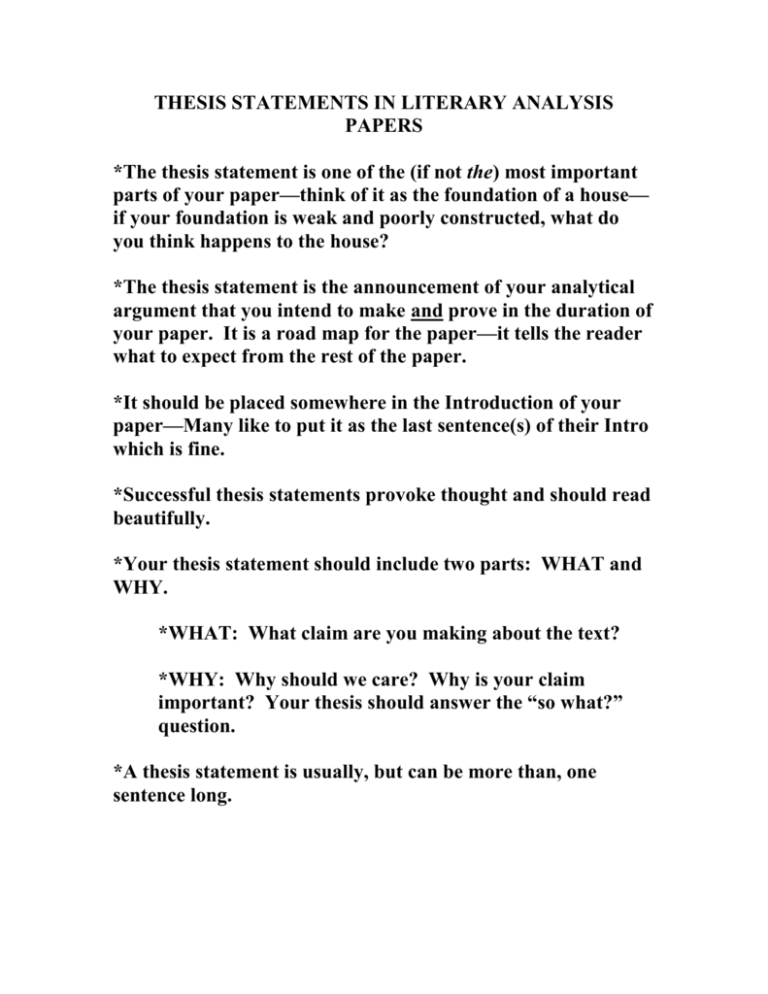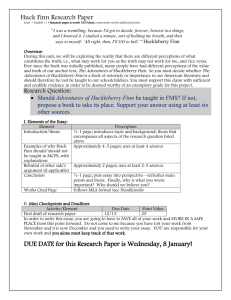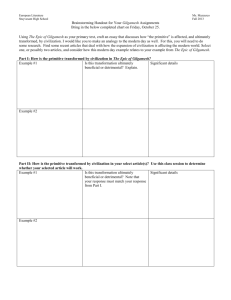Sample literary thesis statements
advertisement

THESIS STATEMENTS IN LITERARY ANALYSIS PAPERS *The thesis statement is one of the (if not the) most important parts of your paper—think of it as the foundation of a house— if your foundation is weak and poorly constructed, what do you think happens to the house? *The thesis statement is the announcement of your analytical argument that you intend to make and prove in the duration of your paper. It is a road map for the paper—it tells the reader what to expect from the rest of the paper. *It should be placed somewhere in the Introduction of your paper—Many like to put it as the last sentence(s) of their Intro which is fine. *Successful thesis statements provoke thought and should read beautifully. *Your thesis statement should include two parts: WHAT and WHY. *WHAT: What claim are you making about the text? *WHY: Why should we care? Why is your claim important? Your thesis should answer the “so what?” question. *A thesis statement is usually, but can be more than, one sentence long. Examples of Literary Thesis Statements: * “Mark Twain’s Huckleberry Finn is a great American novel.” *What’s wrong with this thesis statement? *An opinion about the book, not an argument. * “In Huckleberry Finn, Mark Twain develops a contrast between life on the river and life on the shore.” *Better? How so? What is still missing? *Doesn’t answer the “so what?” question—what is the point of the contrast? What does the contrast signify? * “Through its contrasting river and shore scenes, Twain’s Huckleberry Finn suggests that to find the true expression of American ideals, one must leave ‘civilized’ society and go back to nature.” *Even better? *It presents an interpretation of a literary work based on an analysis of its content and answers the “so what” question. * “Edgar Allen Poe’s work was affected greatly by the current events of his life, covering his family life, his childhood, and his career; these events changed the style and subject of his works.” *What’s wrong with this thesis statement? *More questions than answers: which works will be explored? What current events? What childhood or career events? How did Poe’s style change and WHY IS IT IMPORTANT? * “There is a lot of symbolism in The Scarlet Letter.” *Bad? Why? * “Hawthorne’s use of symbolism in The Scarlet Letter falters and ultimately breaks down with the introduction of the character Pearl.” *Better? Why? * “The character of Ben in Arthur Miller’s Death of a Salesman is a great [or important, or crucial, or unforgettable, etc.] character.” *What’s wrong with thesis? *This does not say enough to serve as the basis for an essay. Besides, each of these judgments is entirely a matter of personal opinion because none of them define the criteria by which the judgment is being made. * “Through Paul’s experience behind the lines, at a Russian prisoner of war camp, and especially under bombardment in the trenches, Erich Maria Remarque realistically shows how war dehumanizes a man.” *What can we anticipate that the author of this thesis will prove to us in the rest of the paper? Sample literary thesis statements TOPIC Character QUESTION AND THESIS STATEMENT In The Scarlet Letter, Nathaniel Hawthorne depicts Pearl as alien to her society until her father acknowledges her. Relationships among Characters In The Catcher in the Rye, Salinger shows that the relationship between Holden and Phoebe acts as a positive force on Holden. Themes Style: Effective use of imagery, foreshadowing, or symbolism to advance character development, theme or artistic purpose Style: The point of view, or narration advance character The Adventures of Huckleberry Finn is a satire on racism. Through the use of images and symbols in The Catcher in the Rye, Salinger reveals many subtleties about Holden's sensitive personality The final fifth of The Adventures of Huckleberry Finn does not help fulfill Mark Twain's artistic purpose in the novel. development, theme or artistic purpose Setting Structure Historical Context: The social, political, and cultural climate in which the author lived and the novel was created Critical Overview: Background on critical reputation of the novel including controversies Media Adaptations The raft on the Mississippi River in The Adventures of Huckleberry Finn is a place with different rules than the towns along the river. In The Adventures of Huckleberry Finn, Mark Twain uses the river journey to illustrate Huck's increasing awareness of the moral hypocrisy in the "civilized" South. Arthur Miller changed some of the facts about the Salem Witch Trials in his play, The Crucible, to advance his artistic purpose. What reasons do critics have for censoring The Adventures of Huckleberry Finn? Subordinate questions: Is the novel obscene? Is the novel racist? Is the language too coarse? Is it immoral? The 1992 movie Of Mice and Men more poignantly expresses the alienation and loneliness of migrant farm workers than the novel.








